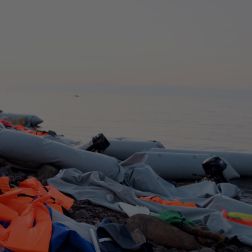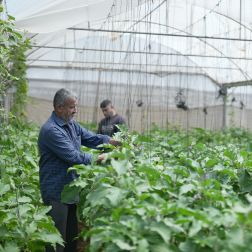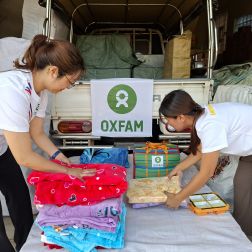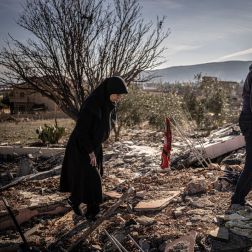- 4 mins read time
- Published: 20th June 2016
Let’s stand as one – World Refugee Day 2016
I visited some of Europe's refugee camps recently. Oxfam was founded in 1942 to help civilians that were starving in Nazi-occupied Greece, and now, more than 70 years later, we are once again active in Greece. Oxfam is working in camps in Lesvos and the mainland, providing clean water and sanitation, food, and helping people who have fled conflict and hardship to understand their rights.
In mainland Greece, there are around 45,000 people scattered across 40 different refugee camps that are run mainly by the country's military. In the two sites I visited, refugees were living in rows of flimsy tents on hard rocky ground. Conditions were basic, in some instances squalid, and the air was thick with flies. I saw people in obvious need of urgent medical assistance. Greece is experiencing a deep, traumatic economic recession that complicates its efforts to respond to refugee needs - still, I never expected to see such a scene in wealthy Europe.
I spoke to a man from Syria, whose wife and four children were in Germany. Earlier this year, his family had travelled from Turkey to Germany via a combination of train, bus and car - it had taken them around seven days. A few weeks later, he set out to follow them but by then the so-called 'Western Balkans route' had been shut. He has been in the camp in Greece for months now and with the borders closed and uncertainty around how to claim for asylum, he doesn't know when and how he will see his young children and wife again. The unilateral closure of borders in Europe has restricted the movement of people and it has left a thousand cruelties in its wake. Who gains when children are kept apart from their parents?

Left: Mawia* (4) and her mother wait to be reunited with Mawia’s father, Mahamoud after getting split up in the crowd at a registration centre for refugees and migrants in southern Serbia. [*Names have been changed to protect identities.] Photo: Sam Tarling/Oxfam. Right: Washing hangs on the fence at Katsikas camp in northwest Greece. Photo: Aubrey Wade/Oxfam
I walked on through the camp. A little girl ran to me, wanting to be hugged. She wouldn't let me put her down. A volunteer was taking care of her and her baby sister, while her mother tried to find a doctor. I learnt later that their mother is haunted by what happened to her in Syria: her home was pulverised by a bomb, killing her close relatives. She doesn't sleep at night.
In Syria, schools, hospitals and residential areas continue to be hit. Civilians are caught between the bombs from the sky and shells and motors from the ground. Yet, European governments concluded a deal with Turkey in March that is predicated on pushing people fleeing that conflict, and others like it, away from Europe and back to Turkey - a country which is now home to at least two million refugees, more than any other country in the world.
A core tenet of international law - the right to seek protection in another country - is under threat. And it threatens all asylum seekers. Syrians, at least, still benefit from some public sympathy and, when they are able to access a fair asylum processes, the recognition rate is around 90 per cent in most countries (see UNHCR statistical yearbook). Other nationalities, such as Afghans, are being pushed even further to the margins - they've been dubbed the 'The Refugees' Refugees'.

Left: Ibada* (29) with her 16 month old daughter Jana*. They now live in Zaatari refugee camp in Jordan, home to over 80,000 people. Ibada and her family fled their home in Syria after their house was burned down. [*Names have been changed to protect identities.] Photo: Sam Tarling/Oxfam. Right: A woman collects buckets and a jerry can from an Oxfam distribution in Nyarugusu camp in Tanzania. Tanzania has welcomed over 130,000 refugees fleeing violence in Burundi since April 2015, now living in Nyarugusu and Nduta camps. Photo: Amy Christian/Oxfam
But it's not all bleak. Around the world, there are countless acts of solidarity.
In Greece, I saw teams of international and national volunteers working in the camps. Oxfam staffers told me about elderly Greek villagers inviting pregnant women into their homes when the women neared term to make sure they were in easy reach of hospital.
In less than 100 days, two major summits on migration, one hosted by the UN and a separate summit hosted by President Obama, will take place in New York on 19 and 20 September. They are a chance for world leaders to show that spirit, put a halt to the race to the bottom and help the millions fleeing conflict, poverty and disaster.
Maya Mailer is Head of Humanitarian Policy & Campaigns at Oxfam International.
Stand as One
We are in the middle of the worst refugee crisis since the Second World War. 65 million people have been forced to flee their homes because of conflict and war. Many more are on the move because of natural disasters and entrenched poverty.
Together we can stand as one and help vulnerable families forced to flee for their lives.




